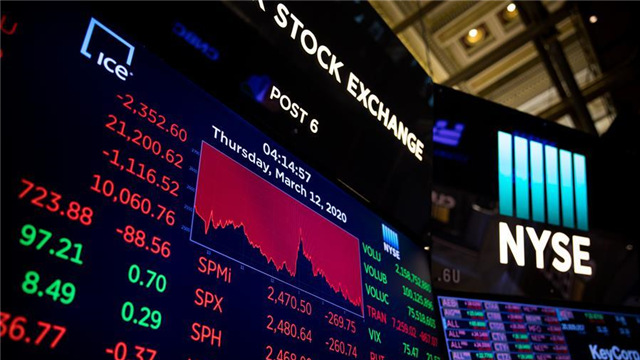Oil, retail sales reports push stocks lower
By SCOTT REEVES in New York | chinadaily.com.cn | Updated: 2020-04-15 23:32

Downbeat reports on oil, manufacturing and retail sales pulled US stocks down at the opening Wednesday as the economy continued to sag during the coronavirus outbreak.
The Dow Jones Industrial Average fell 530 points on the open and drifted lower in early trading.
The Dow lost 581.38 points, or 2.42 percent, to 23,389.79. The S&P 500 lost 2.60 percent. The Nasdaq Composite slid 2.24 percent.
Bank of America traded about 5 percent lower after reporting weak earnings. Goldman Sachs and Citigroup declined about 4 percent each as the financial sector struggled.
Bond prices rose.
The US Commerce Department said retail sales fell 8.7 percent in March – the largest one-month decline since the government began tracking sales in 1992.
The International Energy Agency (IEA) said Wednesday it expects global oil demand to fall by 9.3 million barrels a day this year as government-imposed stay-at-home orders intended to combat the spread of the coronavirus, also called COVID-19, severely limit economic activity.
For April, the IEA estimated that demand for crude oil will fall by 29 million barrels a day, or about 29 percent of the world's 100-million-barrel a day demand in 2019.
"The global economy is under pressure in ways not seen since the Great Depression," the IEA said in a report. "Businesses are failing and unemployment is surging. Activity in the transportation sector has fallen dramatically almost everywhere."
The IEA expects global economic growth to decline 4.8 percent this year.
Oil prices, a proxy for future economic activity, fell after the report was released.
West Texas Intermediate crude, the gauge for US prices, fell 0.50 percent to $20.01 a barrel.
Brent crude, the worldwide benchmark, fell 4.63 percent to $28.24 a barrel.
The report follows a deal by OPEC and Russia to sharply reduce production. Saudi Arabia and Russia sought to gain market share and flooded the market with oil, driving prices down.
The IEA expects the agreement to reduce oil supplies by 12 million barrels a day in May.
The Empire State Manufacturing Index, a monthly survey of production in New York conducted by the Federal Reserve Bank, fell in April to -78.2, more than twice as low as the -32.5 expected by economists surveyed by Dow Jones and worse than anything in the recession following the collapse of the subprime mortgage market in 2008.
The survey asks about 200 top executives to rate conditions as better or worse in the last month. Only 7 percent said conditions were stronger while 85 percent said things were worse. New York is the epicenter of the coronavirus outbreak in the US.
"New orders and shipments declined at a record pace," the New York Federal Reserve said in a statement. "Delivery times lengthened, and inventories fell. Employment levels and the average workweek both contracted at a record pace."
"Input price increases slowed considerably, while selling prices declined modestly. Though current conditions were extremely weak, firms expected conditions to be slightly better six months from now."
About 59 percent of respondents reported fewer employees and only 3.3 percent said they had hired additional workers. About 77 percent said orders had fallen and 76 percent said shipments had declined.
























